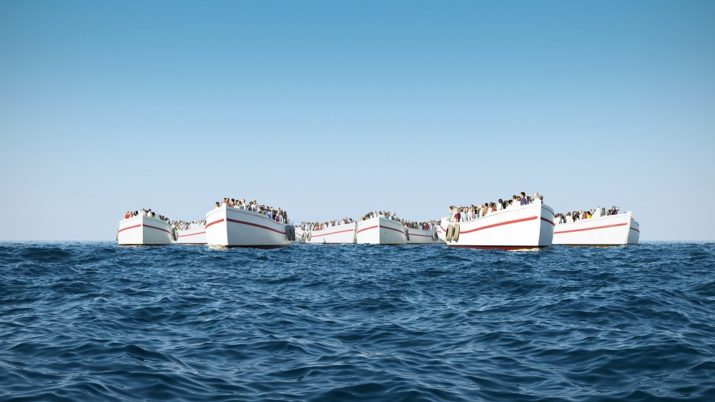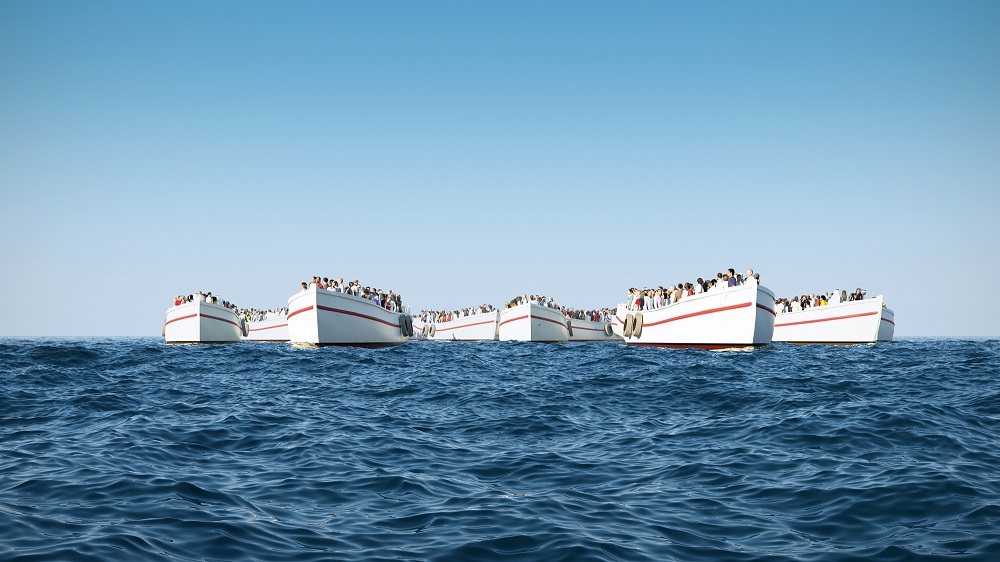

The 21th Century Worldwide Refugee Crisis
International Studies 182 – Rocky 200
Mondays 6 – 8 PM (first 6 weeks)
Currently, around 60 million people across the globe are displaced by war, violence, and environmental destruction; half of them are children. This worldwide refugee crisis of forced migration is the largest displacement of people since WWII. Governments, NGOs, and institutions of higher learning across the globe are struggling to come to terms with the sheer scope of this crisis. Together with faculty from the departments of Philosophy, Political Science, History, Geography, Economics, Education, and Environmental Studies, as well as a visiting photographer, representatives from two NGOs, and a Syrian refugee scholar, students study different aspect of the crisis to explore ways in which we, as global citizens, can contribute to alleviating this crisis.
Books to be purchased at the Vassar bookstore:
-Michelle Bogre, Photography as Activism: Images for Social Change
-All other readings are on moodle.
I have put together three general research categories/areas for you to choose from:
- Media coverage of past refugees crises to learn about how the U.S. responded
VC has been helping with refugee crises going back to the 19th century, but for purpose of this class, I ask that we stay focused on crises beginning with WWII and its aftermath, when the humanitarian institutions and conventions, that are still in place today, were first set up. Be sure to be as inclusive as possible as you consider a topic, including forced displacements on all continents in the wake of war, postwar settlements, decolonization, draught, climate change, or political violence and persecution as you formulate your group project.
Since your work will become part of our website to serve as a portal of information and education, let us focus first on exploring these crises at their moment of occurrence, and how the world, the U.S., and we at Vassar responded or failed to respond in the immediate aftermath (say 5 years or so). Here are some of the obvious crises, but you, or a group of students may also define your “own” research topic as long as you discuss it with Professor Höhn.
A selected (and by no means comprehensive) list of refugees crises we might want to explore: The forced migrations and resettlements during WWII and in its aftermath in Europe, Africa, Asia and the Middle East; the 1956 Hungarian Revolution; and the 1956 Cuban Revolution; the 1970s refugee crisis brought on by war in Vietnam and Cambodia; the 1980s exodus of Russian Jews from the former Soviet Union; the wars in Yugoslavia after 1989; the 1990s crisis in Rwanda and later Sudan; migrants escaping war and violence in Central America and Mexico; the plight of displaced Rohingya people, the
displaced in Tibet, and refugee crises in Sierra Leone, Darfur, Congo, Mali, Sudan, Nigeria and Kenya. (The sign up sheet for research projects is on moodle).
- Vassar Special Collections
There is also an opportunity to research the Special Collections in the Vassar Library, that contain extensive holdings from the 1930s and 1940s, for example, when President Henry Mac Cracken was instrumental in getting Vassar involved in rescuing students and scholars persecuted by the Nazis. There are also records of Vassar Women’s Relief efforts in France after WWI. The archival specialists Dean Rogers and Laura Streett stand at the ready to assist with any such research. Their suggestions will also be part of the Libpage
The following collections hold archival materials related to past refugees crises:
-McCracken Papers
-Displaced Scholars
-Einstein Papers
-Vassar Relief Unit (to help in France after WWI)
-Good Fellowship Club
-World Youth Congress
- Gather information on all institutions and initiatives involved in refugee work
This is a project for a team that might be interested in helping us build and expand the Refugee Solidarity website by doing some research on initiatives that other institutions, colleges, tech groups, NGOs or faith-based groups are doing in the U.S. as well as in other countries. Such a project could also focus on exploring internships, scholarships that might be useful for volunteers planning to go abroad or help with migrants already in the U.S.
Class Meetings, Speakers, and Readings
Week 1 – February 1
Refugee Crises, Past and Present
6 – 6:45 PM: Professor Maria Höhn (History). Introduction of the class as well as a general background on the scope of the crisis, what we at Vassar have been doing, and how the students in this class can be part of the larger student-led Refugee Solidarity initiative.
Readings:
Please read selectively in the special edition of the Journal of Forced Migration. I am asking students to read up on some of the larger issues before the class begins. Since this is such a short class, we all need to get all a head start. Destination Europe is a good general source of information for you to have for your research project. It has lots of short essays on different aspects of the crisis. All the readings are on moodle.
*-Destination Europe, Special Issue of Forced Migration, Oxford University
*-Migration Report (December 2015)
*-Thought-provoking article from the New Yorker (2010) that raises many difficult issues that surely will come up in class
*-Check out this site that shows “select” (my word) refugee flows since 1945, be alert to the omissions
7 – 8 PM, Professors Giovanna Borradori (Philosophy) and Sam Opondo (Political Science):
*-Jacques Derrida, “Avowing – The Impossible: Returns, Repentance and Reconciliation, in
Elisabeth Weber, Living Together: Jacques Derrida’s Communities of Violence and Peace, Fordham University Press, 2013, 18-44 (on moodle)
You are invited to join Professors Borradori’s and Oppondo’s class “Spaces of Exception” for a screening of the film Welcome by Philippe Lioret, 2009.
Saturday, January 30, 3:00 – 5:00 PM, in Rockefeller Hall 200. For the film, see: http://www.welcomemovie.com.au/
Wednesday, 3 February, Taylor 203, 8 PM
Screening of Climate Refugees: http://www.snagfilms.com/films/title/climate_refugees
Week 2 – February 8
Climate Change, Displacement, Power /(In)equity
Professors Stuart Belli (Environmental Studies) and Joseph Nevins (Geography)
Please watch this film: http://www.snagfilms.com/films/title/climate_refugees
(It will take a while to load, so be patient, if you are planning to watch it on your own).
For rising sea levels and their impact, see this interactive map: http://cegis.usgs.gov/sea_level_rise.html
Readings:
-*John Wendle, “The Ominous Story of Syria’s Climate Refugees”
-*Collin Kelley, “Climate Change in the Fertile Crescent and Implications of the Recent Syrian Drought”
-*Sonia Nazario, “The Refugees at Our Door,” The New York Times, Oct. 11, 2015
-*Federico Barahona, “Migration Is Not a Crime,” NACLA.org, Jan. 4, 2016;
-*Levi Vonk, “Long Walk to Deportation,” Foreign Policy, Jan. 8, 2016
Week 3 – February 15
Kristin Rehder (Photographer, Lancaster) – Sponsored by American Studies
Kristin Rehder is conducting a documentary photography project of resettled refugees in Lancaster, Pa., to examine concepts of community and acceptance: http://www.wherehopefindshome.com
Readings:
-Michelle Bogre, Photography as Activism: Images for Social Change, Burlington,
MA: Focal Press, 2012.
-Please also review these two websites:
http://www.facingchangeusa.org
http://petapixel.com/2015/11/04/6-photographers-asked-to-shoot-portraits-of-1-man-with-a-twist
For Facing Change, go to the stories and read the text, then launch the slideshows for at least three of the ten entries. For 6 Photographers Asked to Shoot Portraits, please review the video so we can discuss it in class.
Tuesday, February 16, 6:00 PM, Rocky 200
Lecture by a Syrian archeologist Salam al Kuntur
(sponsored by the Office of the President and Refugee Solidarity)
Professor al Kuntur is in the U.S. under the auspices of the Scholars at Risk consortium, which protects scholars worldwide whose lives are threatened because of their ideas or work. Hopefully Vassar College will be hosting its first “Scholar at Risk” in fall 2016.
Week 4 – February 22
Refugee Advocacy Work – Sponsored by American Studies
Rose Anderson, Scholars at Risk Network
Rose Anderson from Scholars at Risk, a consortium of universities and colleges committed to protecting scholars suffering grave threats to their lives and liberty. SAR helps primarily by arranging positions of sanctuary at institutions in our network for those forced to flee. Rose Anderson is the Program Officer for Protection Services, and assesses scholars’ cases for placement within the SAR Network. Prior to joining the SAR team, Rose worked with the Human Rights Advocates Program at Columbia University, a capacity-building and training program for human rights activists from around the world. Rose also worked with WITNESS, where she trained activists in using video for human rights documentation and developed training materials. Rose received her M.A. in Human Rights from Columbia University in 2014. Rose received her B.A. from the Global College program of Long Island University. Rose will talk to us about the advocacy work for threatened scholars that students can be involved in.
Chris George, Executive Director of IRIS (Integrated Refugee and Immigrant Services, New Haven)
Chris George works for the New Haven-based refugee resettlement agency. Chris has spent many years advocating for — and helping to settle –refugees in the US. For the past 10 or 12 years, IRIS has done a lot of work with Iraqi refugees. Over the past year, they have focused on and worked with Syrian refugees. Chris also has a long history of working in the Middle East, and on Middle East-related issues. In the past, he has worked with Human Rights Watch, American Friends Service Committee, the Peace Corps and Save the Children –among others. He has lived and worked in the Middle East –including many years in Ramallah.
Week 5 – February 29
The Economic Pros and Cons
6 – 7 PM: Professors Sukanya Basu (Economics)
-Elena Cortes, “Are Refugees Different from Economic Immigrants? Some Empirical
“Evidence on the Heterogeneity of Immigrant Groups in the United States”
-*http://www.brookings.edu/blogs/future-development/posts/2015/09/16-economic-impact-refugees-cali
Let’s Talk About Education
7 – 8 PM: Professor Maria Hanzapolous (Education)
Students will discuss some of the educational challenges that face refugee and internally displaced children and will also consider educational initiatives (grassroots and governmental) that seek to support them
Readings:
-*Lynn McBrien, “Educational Needs and Barriers for Refugee Students in the United States: A Review of the Literature,” Review of Educational Research, 329-64,
-*Migration Policy Institute, “The Educational Experiences of Refugee Children in Countries of First Asylum,” 1-22.
-*UNICEF, “Education under Fire: How Conflict in the Middle East is Depriving Children of their Schooling,” 1-9.
Week 6 – March 6
Research Presentations by Students and Discussion of the Way Forward
Please note that Refugee Solidarity will be bringing another “Scholars at Risk” speaker to campus
April 6 Lecture by SAR Scholar, Semahagn Abede
“The Stifling of Democracy and the Repression of Academic Freedom in Ethiopia”
(sponsored by the VSA, Refugee Solidarity, and the Dean of the Faculty)
http://humanrights.uconn.edu/faculty_staff/semahagn-abebe/
Some interesting projects that others are doing:
- Amman, Jordan project that makes it possible for refugees to tell their stories
- Story of one refugee and his journey to safety
- UNHCR (United Nations High Commissioner for Refugees) project: unhcr.org/en
- “See refugee life through the voices and visions of children, who are experts on their own lives”
- https://www.youtube.com/watch?v=V-KV4bpdnfY
- https://www.mercycorps.org/photoessays/jordan-syria/inside-azraq-jordans-newest-refugee-camp
- http://www.millsaps.edu/sudan/ (amazing student projects under the supervision of Professor Greg Miller with his students at Millsaps College.)
This syllabus by Maria Höhn is part of our special feature Forced Migration, Cultural Identity, and Trauma.
Photo: Refugees boat floating on the sea | Shutterstock
Published on February 1, 2017.




